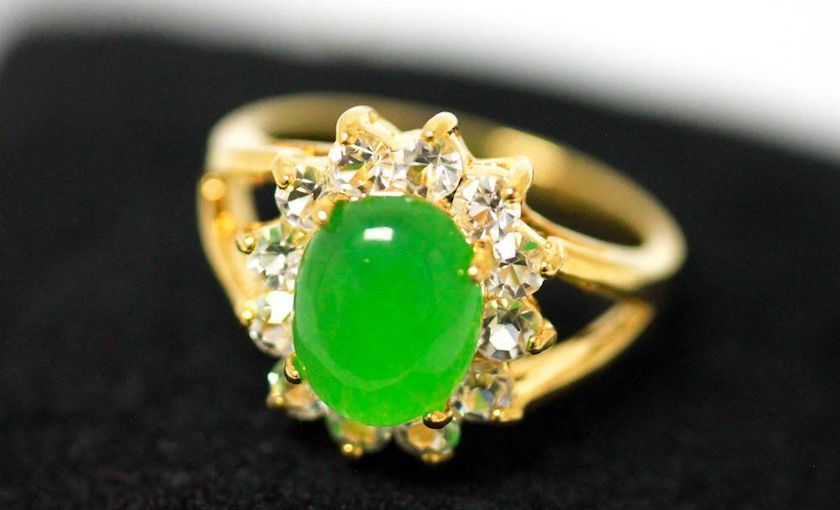Does Synthetic Jade Exist?
You might find synthetic jade for sale, but is this material really lab-made jade or something else? Learn how to identify synthetic jadeite.
2 Minute Read
Answer: Scientists have successfully synthesized jadeite but not nephrite. However, this lab-created material isn't produced commercially. You might encounter so-called "synthetic jade" for sale as loose stones or in jewelry, but this material is most likely a jade lookalike.
Synthetic Jade by General Electric
Attempts to synthesize jadeite — one of the two gem materials classified as jade — go back as early as the 1880s and continued unsuccessfully through the mid 20th century. Synthetic jadeite was finally successfully created by General Electric (GE) researchers R. C. DeVries and J. F. Fleischer and documented in 1984. Although the green, black, and lavender jadeite they produced could be considered "gem-quality," it lacked the translucency of "Imperial" jadeite. However, GE continued to research synthetic jadeite. In 2002, they successfully produced green jadeite that rivaled high-quality "Imperial" jadeite.
Interested in this topic?
This article is also a part of our Jade Specialist Mini Course, in the unit Distinguishing Jade Simulants and Other Gem Materials.
Distinguishing Synthetic from Natural Jadeite
Many of the gemological properties of the GE synthetic material match those of natural jadeite, but some differences do exist. Researchers S. Cao, L. Qi, Q. Guo, and Y. Lu have documented the following differences:
- The infrared (IR) absorption spectra of the synthetic jadeites displayed characteristic peaks at 3614, 3471, and 3373 cm−1. This differs from that of natural jadeites. (Gemologists can observe the IR absorption spectra through Fourier Transform Infra-Red (FTIR) spectrometry).
- Two strong, broad bands centered at 630 and 445 nm (due to Cr3+) dominate the visible absorption spectra of the synthetic jadeites. In contrast, natural jadeites sometimes show a weak band at 437 nm (due to Fe3+ substitution for Al3+).
- The synthetic jadeites also showed strong red cathodoluminescence (fluorescence under a beam of electrons).
A Hanneman-Hodgkinson Green Stained Jadeite Filter may also help distinguish natural from synthetic jadeites. In incandescent light, a synthetic green jadeite will appear pinkish orange under this device. In contrast, natural green jadeite will remain green. Dyed green jadeite will appear pale brownish pink to reddish orange.
What is the Synthetic Jade That Appears for Sale?
To date, GE has not produced synthetic jadeites commercially. There are no other manufacturers known to have successfully created this material in a laboratory. Despite this, you might find loose stones sold online as "synthetic jade" or jewelry pieces supposedly made with this material.
If you find a so-called "synthetic jade" for sale, you're probably looking at a lookalike or simulant. These are gem materials that may resemble natural jadeite or nephrite but are neither. These can range from glass pieces to natural gemstones of other species, such as serpentine or prehnite, or even assembled stones.
In these cases, the term "synthetic" is likely being used in the popular sense of "not real." Gemologists make a distinction between lab-created or "synthetic" gemstones that have the same properties as their natural, mined counterparts and lookalike or simulant gemstones that just look like another material. In contrast, vendors may simply be using what they consider an innocuous term that still allows them to associate the product with the caché of the "jade" name. That is, the name "synthetic jade" probably attracts more attention than, say, "prehnite" and invites less suspicion than "fake jade."
The term synthetic may also be used to describe a dyed natural jade piece. In this case, the color is considered "synthetic" or "not real" or "not natural." Again, "synthetic jade" probably sounds more appealing than "dyed jade."
International Gem Society
Related Articles
Jadeite Value, Price, and Jewelry Information
Maw Sit Sit Guide
Identifying Jade Treatments
Jade Sources
Latest Articles
800 Years of Mogok: A Celebration in Tenuous Times
What is the Average Gemstone Faceting Yield?
Pyroxmangite Value, Price, and Jewelry Information
How to Identify Emerald Simulants and Synthetics
Never Stop Learning
When you join the IGS community, you get trusted diamond & gemstone information when you need it.
Get Gemology Insights
Get started with the International Gem Society’s free guide to gemstone identification. Join our weekly newsletter & get a free copy of the Gem ID Checklist!
